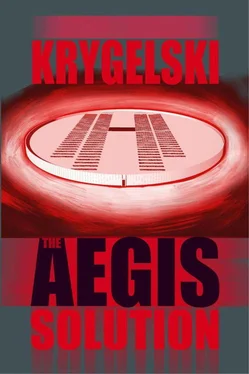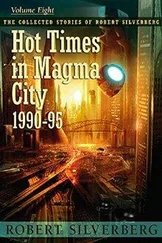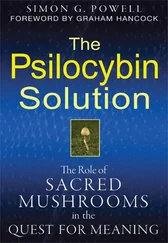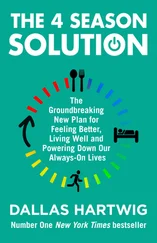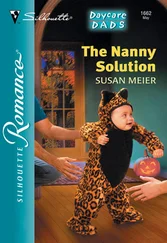“How frustrating it must be…or will be…if an opportunity to know all of the facts presents itself to the progenitor of this solution before he or she dies. For, as he — and let me use the male pronoun for the sake of convenience — first conceived of and developed the plan in his own mind, met and persuaded, cajoled, and convinced those persons necessary to carry out the plot and join the group of designated survivors to begin the new world, he must have believed that he was the invisible hand, guiding and determining the fate of all of mankind. Little did he know that he was nothing but a pawn. He must have held firmly to the belief that he was, with his own mind and his own will, drafting the pages of future history. It never would have occurred to him that he was merely an actor playing his role in a script.”
Leah, mesmerized by his narrative, asked, “Then who actually was calling the shots?”
Wilson shifted his gaze to her. “Ah, that is the question, as it has always been. And just as it has always been the case throughout the history of man, we are forced to examine the facts at hand and draw our own conclusions. What we know, when viewed in this light, can lead us down a startling path. It is only when all of the facts are laid out on the table, side by side, that two inescapable patterns emerge. The first is the age-old relentless destruction of man by man.
“Let’s begin, shall we, with the foundation of Aegis? It is a fact that poor, troubled Neve Walker took her own life. Thousands do every year. But none share the happenstance of being the only child of the most powerful man on Earth, a man who, due to his religious upbringing, believed that she had committed a cardinal sin and was irrevocably destined to spend an eternity in hell. And none of the nearly countless others, who die by their own hand, have a father with the wherewithal to build Aegis as a way to save others from the same fate.
“It is also a fact that somewhere on Earth a man, as I described a moment ago, no doubt weary and disturbed by the daily, inexorable signs that our species was disintegrating, and following a pernicious path, was presented with the possible solution: a microbe, a pathogen so deadly that no one on Earth could survive it. Coupled with the presentation of this pathogen was the antidote, the vaccine — an inoculation, or perhaps a pill — which could be administered to those of his choosing. To that man, this must have seemed like providence. It would have been as if he, and those he believed should survive, were on a sinking ship and there, before him, was offered a lifeboat, a lifeboat known only to him, a salvation which was exclusively his to dispense. The prospect would have been intoxicating.
“His plan was set in motion. Men and women of his choosing would be invited to participate. If you think about it, who could possibly refuse the offer to survive after the destruction of the species? I am certain the minutiae of generating the list of survivors would have taken substantial time to complete and would have been fraught with drama and betrayal. Any such action, which by its very nature bestows power, would be. Men or women, offered the vaccine, would have it left to them to determine whether their spouses, their children, their children’s spouses would be added to the list, or whether they would take advantage of the impending cataclysm to resolve their own petty disputes. It is indeed a rare individual who would not be corrupted by this opportunity to decide who lives and who dies.”
The picture, painted by Wilson to his small audience, held them in thrall. No one dared speak.
“The two facts we have thus far discussed, the creation of Aegis and the development of the microbe and vaccine, would appear to be unrelated and proceeding on independent courses. Most likely, those involved in the doomsday plot never gave this institution a thought.
“To return to Aegis now, we have observed and pondered the evolution of the societal microcosm within these walls for some time. At its inception, Aegis appeared to be utilized primarily for its stated purpose. The vast majority of the entrants were those who chose coming to this place rather than consummating the act of suicide. It was at said time, when nearly all of the residents were of this inclination, that the so-called riot occurred, an ugly and base visceral manifestation of the mental state of the group.
“However, over the past few years, we have noticed a change. Fewer and fewer of the new arrivals were of this nihilistic nature. More and more of them were, as I was, refugees from a society gone awry, either eager to hide from the outside world or inclined to create a better society in Aegis. Many of us, including some who stand here with me now" — he glanced meaningfully at Sweezea, Crabill, and Hutson — “shared the vision of mankind held by the perpetrators of the doomsday plot, without sharing a desire for the horrendous solution.”
The three men nodded slightly, indicating their agreement with Wilson’s assessment.
“As the newer arrivals became the predominant population of Aegis, something strange began to take shape. The suicidal segment seemed to require a progressively more subtle trigger. Their number rapidly diminished by their own hand, leaving the newer occupants free to construct a more viable system.
“Yet, this natural course of events was not sufficient in and of itself. The anti-social and the sociopaths in ZooCity showed no inclination to move out of the way on their own. Intervention was needed, and intervention was provided in the form of one of Mister Faulk’s lieutenants, Doctor Boehn, a petty and shallow man, someone ripe to fall victim to the power granted to him by the impending calamity. His initial and transitory urge was to utilize the habitants of ZooCity as foot soldiers and procurers. I suspect, however, that this utilitarian exploitation was a convenient mechanism to justify the act of eradicating them. His action in doing so was either part of the script of man’s seemingly idiopathic destruction of man, or an incredible, and I use that term literally, coincidence. I am certain that he would have seen it as ironic that he inadvertently increased the safety inside Aegis.”
“Wilson,” Elias interrupted, “are you saying that Boehn was manipulated into killing off all of the ZooCity residents? And, if so, by whom?”
Wilson smiled at Elias. “Manipulated? That implies the presence of a person. I would opt to say guided by the inevitable script I mentioned; however, the answer to that question, once the facts are all presented, is for you to decide.”
“Present away!” Tillie urged.
“And so I shall. We believed that Mister Faulk possessed a viable vaccine. Our ignorance of the truth would have propelled us outward, beyond the walls of Aegis. Had we obtained the vaccine from his vehicle and administered it to ourselves, we would have traveled away from Aegis and met our deaths. Yet, as we tried to leave, we found that the exit at the end of this hallway was made to be unusable by the falling debris from the roof. I ask you, Mr. Clements, as you circled the perimeter of Aegis, were the shattered remnants of the solar panels heaped everywhere along the wall, or only in the proximity of the exit door?”
His voice hushed, Clements answered, “Just the exit.”
“Another coincidence? Then there is the secret subterranean exit, of which only Tillie was aware. It was, by coincidence, rendered useless by bats and snakes, even though it had been easily accessible on her last exploratory venture.”
Wilson stopped for a moment and surveyed the faces of his friends. Their minds, in various stages, were absorbing his message, as he could see expressions both awed and confounded.
“Mister Faulk’s presence itself is peculiar. Why, in this eleventh hour of the plan in which he was immersed, did he feel a need to visit Aegis? And yet, if he had not, we would not have discovered the reality of what is transpiring outside these walls. We would have overpowered Boehn and his men, and we would have left to meet our certain fates.
Читать дальше
